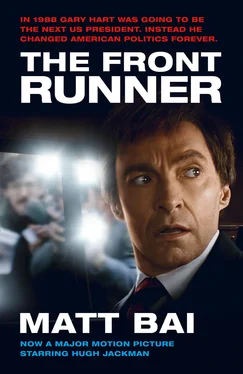And I believed it, too, until Hart shot me a furtive, conspiratorial look and shook his head quickly, as if to say: Not a chance in hell.
How I came to return to Troublesome Gulch on that day in 2009, visiting with some washed-up politician at the moment when just about every other political writer in America was absorbed by the ascension of our first African American president, is a story of failure and the hope for redemption, I guess. Not just Hart’s, but mine, too.
The whole thing began a few weeks before Christmas in 2002, when, as a new writer for The New York Times Magazine, I came across a short newspaper item about how Hart was considering a quixotic comeback bid for the presidency. Like everyone else, I knew Hart only from the memory of scandal—in my case, from reading Newsweek in my college dorm room in 1987—and what motivated such a man to want to rekindle this memory in his advancing years, to want to relive in some way the defining ordeal of his life, struck me as the kind of mystery at the intersection of politics and psychology I found most intriguing. The idea of interviewing Hart after all these years struck my editors and friends as kind of spooky and fun, like attending a séance in the French Quarter.
I met Hart at the Denver headquarters of the global law firm Coudert Brothers, which, as it happened, consisted of a single nondescript office—Hart’s—and a waiting room, in the corner of which stood a sad little Christmas tree. Hart sat in a swiveling office chair next to his computer and invited me to take a seat a few feet away. He explained, alluding to the modest surroundings, that Coudert Brothers had informed him it intended to close its Denver office—or, in other words, that it no longer needed Hart’s services as an international lawyer, specializing in executing deals in the former Soviet Union. He would soon need to find another professional home. Hart spoke lightly of this conundrum, laughing easily at himself, as if the circumstances of his career had reached a level of absurdity even he couldn’t fail to find amusing. Whatever arrogance he had once possessed, a famous incapacity for suffering those less intellectually inclined than himself, had been replaced in his advancing years by a sense of goodhearted resignation, which had the effect of making him immediately and immensely likable.
Two things struck me very clearly during that first meeting with Hart. The first, and more surprising, was that he was probably the flat-out smartest politician I had ever met, and I had met quite a few. Not smart in the Newt Gingrich sense, meaning that he had memorized a small library of philosophical and literary texts and could quote them back to you—although Hart had this going for him, too. Nor smart in the Bill Clinton sense, meaning that he could juggle a Sunday crossword puzzle while simultaneously dissecting a point of policy and committing to memory the names of ten strangers in the room, which was a kind of freakishness. Hart didn’t care that much for people’s approval. No, Hart’s gift was to connect politics and culture and theology and history and technology seamlessly and all at once—to draw from all available data points (extemporaneously, it seemed) a larger picture of where everything was headed.
Richard Ben Cramer, who profiled Hart in What It Takes, had a name for these periodic revelations; he called them “Hart-facts,” because once Hart offered them up, they became self-evident, as if it would have been impossible for anyone to have overlooked them in the first place. Hart himself would tell me, “I have only one talent. I can see farther ahead than other people. And I can put pieces together in constructive ways, both to avoid disaster and to capitalize on change.”
During that first day in Denver, Hart explained, by way of a brief history of the Middle East, why a war in Iraq, if in fact that’s what George W. Bush was planning, would ultimately be a catastrophe. We might win a quick military victory, he said, but it would become difficult to extricate ourselves, and it would create more terrorists than it would root out. (Decades before, he had insisted that America’s reliance on oil would lead us, inevitably, into a series of desert wars.) He also mused that growing inequality and the recklessness of the markets might well plunge us, sooner or later, into another depression or something very close. By the end of the decade, both of these offhand riffs, which could have been dismissed in the moment as the rants of a gloomy old man, would prove stunningly accurate.
The second thing I quickly realized was that Hart had no real intention of running for president again, even if he wasn’t yet ready to admit that to himself. The idea had come from some students Hart met during a yearlong sojourn at Oxford. That Hart wouldn’t quite slam the door on the notion was a measure of how much he wanted something else that had nothing to do with the presidency: to be reclaimed. Hart longed to be back in the mix for high-profile assignments or maybe even a cabinet post. He wanted to be the elder statesman he had always imagined he would someday become. If openly mulling a return to the campaign trail was the only way to get someone like me to write about his political ideas, rather than a fifteen-year-old marital infidelity, then so be it.
“I made a mistake,” Hart told me, which seemed to me as close to admitting an affair with Donna Rice as he had ever come. “I think there are very few people in the world who don’t know that. I’ve apologized.” It was “a single incident fifteen years ago,” Hart said, and because of it he had been denied the opportunity to serve his country ever since. “I think I’ve paid my dues,” he said.
“I think all I want is some degree of fairness,” Hart said quietly. “I’m not even asking for forgiveness, but fairness.” He shook his head in enduring disbelief. “Perspective,” he said, then repeated the word quietly to himself. “Perspective.”
Hart didn’t say any of this happily, or even willingly. I did what a reporter is supposed to do. I pushed him on it. I waited the better part of my thirty-hour visit until I felt he was sufficiently comfortable talking to me, and then I bored in on the past, poked at the scar tissue, hoping for … what? A catharsis, maybe. An admission that justice had been done all those years ago, that the truth had won out, as I had been taught to believe it always does. That somehow my role models in journalism—men who had covered that campaign and gone on to become, in some cases, my editors and senior colleagues—had through their tenacity spared the nation something worse than what we ultimately got.
Hart might have been excused for throwing me out of his office, but instead he patiently pleaded with me to move on. He had invited me to visit for the same reason that he was hopeful of a reentry into political life—because he thought the past might finally be the past, of interest to no one at last. “This whole business of ’87 is flypaper to me,” he told me, throwing up his hands. “It’s so frustrating. It’s like being in a time warp. I want to get unstuck.”
The three-thousand-word piece I wrote about Hart did nothing to unstick him, although it was about what he should have expected. I revisited the scandal, talked about his tortured journey in the intervening years, cast doubt on his sincerity about the prospect of running again. I repeated the truism (half true at best, as I later came to understand) that Hart had blithely challenged reporters to follow him around back in 1987, and I arrived at the same psychoanalytical conclusion on which a lot of Hart’s contemporaries had settled back then—that Hart had to have harbored some self-destructive impulse to begin with, because otherwise he wouldn’t have risked his lifelong ambitions on some model and then dared his interrogators to prove it.
Читать дальше












